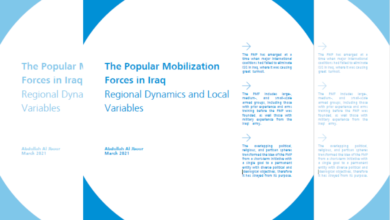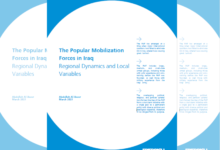War Diplomacy: What comes after the US President’s visit to Israel?

This article examines the implications of President Biden’s visit to Israel on the ongoing conflict in Gaza and its effects on the broader Middle East. Additionally, the article explores how the Arab nations neighboring Israel perceive the visit and delves into the potential consequences in the post-visit landscape.
— Abdullah Jbour
US President Biden arrived in Israel on Wednesday, October 18, during a period of heightened security tensions and a humanitarian crisis resulting from an intense conflict that erupted in the Gaza Strip on October 7. This conflict, which began between Palestinian resistance factions in Gaza, led by the Martyr Izz al-Din al-Qassam Brigades (the military arm of the Hamas movement), and the Israeli army, was in response to an escalation of Israeli violations at the Al-Aqsa Mosque and attacks by Israeli settlers on Palestinian citizens in Jerusalem, the West Bank, and the occupied territories. Israel suffered significant losses, with over a thousand casualties reported in the first three days of the operation, a situation that was characterized as a major intelligence failure for both Israel and the United States.
-The beginning of the confrontation:
Prior to October 7, the Hamas movement and its leaders were subjected to accusations of neglecting their core duty of resistance in favor of foreign regional political affairs. These allegations intensified in the West Bank and the “Axis of Resistance” countries due to the escalation of settlement operations, attacks on Muslims at Al-Aqsa Mosque, and the demeaning restrictions imposed on Palestinians by the Israeli government. This situation prompted the military wing of the movement to carry out an operation named “Al-Aqsa Flood,” which was characterized by strategic military organization, utilizing the element of surprise. The operation laid bare failures in both Israeli and American intelligence.
In response to the Al-Qassam attack, Israel initiated a series of air strikes on Gaza in an operation termed “Iron Swords.” Facing an unprecedented level of opposition, Prime Minister Netanyahu declared, “We are in a state of war. We are not in a military campaign and we are not in a round of escalation.” He proceeded to form an emergency government during the war, which included participation from opposition leader Benny Gantz.
– Balance of human losses:
According to the Palestinian Ministry of Health, the casualty count in Gaza, ten days following the Israeli assaults on the Strip, surpassed 2,778 individuals, the majority of whom were children, along with 9,938 injured. The number of reports regarding missing individuals amidst the wreckage of homes exceeded 1,200, including 500 children still beneath the rubble. Compounding this tragedy, the Israeli army targeted the National (Baptist) Hospital in Gaza, established by the Episcopal Church in Jerusalem, in what has been described as the most horrific human massacre in Israel’s wars on Gaza, with over 500 individuals succumbing to the attack.
On the Israeli side, the number of casualties reached an unprecedented level, inducing a state of profound shock. Approximately 1,400 individuals lost their lives, 291 of whom were soldiers and officers, with no fewer than 30 being American citizens. The Israeli Ministry of Health reported that, by the tenth day, the number of wounded Israelis had climbed to 3,968, including 26 in critical condition and 310 in serious condition.
-The Hospital disaster: a turning point in the course of the battle:
After the unsuccessful efforts by the US Secretary of State to garner Arab support for condemning the Hamas movement and the failed proposal to relocate civilians in Gaza to Egypt, Israel appears to be considering a strategy to broaden the conflict and make it international by opening a second front with the Lebanese and Syrian Hezbollah. The aim of this approach was to secure a victory for Israel, even if it’s only partial, by leveraging international armed support. The initial provocative act was the bombing of the Al-Baptist Hospital, which was intended to incite Hezbollah in Lebanon and Syria, pushing them from a state of limited exchanges of fire to unlimited clashes.
-Israel the spoiled child in the Middle East:
The American administration has historically maintained a close relationship with Israel, characterized by shared interests and marked by unconditional and unwavering support. This sentiment was echoed by President Biden in his initial official statement on the ongoing war in Gaza when he declared, “The United States stands by the State of Israel, just as it did from the moment the United States became the first country to recognize Israel, 11 minutes after its founding, 75 years ago.” Upon his arrival in Tel Aviv, he also stated, “If there was no Israel, we would work to establish it.”
The American administration’s support for Israel extends beyond mere words. It has also rallied European countries to back Israel, offering material, military, and moral assistance. This support has helped shape a narrative that portrays Israel as a victim, despite any investigations by the UN or the United States, and regardless of other perspectives. This narrative persists even though the scale of human suffering is disproportionately higher for the victims in Gaza when considering the number of casualties, health impact, and psychological ramifications.
-The American administration and the debate between principles and interests:
In the context of Israel’s war on Gaza, the American administration has embraced Machiavelli’s principle of “the end justifies the means” by providing Israel with unconditional and limitless support. This stance has been bolstered by a coalition of European nations, which has turned a blind eye to violations and war crimes perpetrated by the Israeli army, even under the purview of the United Nations. Furthermore, the United States exercised its veto power in the UN Security Council to block a resolution that advocated for a humanitarian truce in the Gaza conflict, which would have facilitated the delivery of urgently needed medical aid.
-Possible war scenarios:
First, it is important to recognize that Israel will not let the opportunity for international armed support, endorsement, and American backing go unexploited, particularly since this may be the last time Netanyahu serves as prime minister. He aspires to conclude his extremist career on a high note. Based on the foregoing, there are four potential scenarios on the twelfth day of the war between Hamas and Israel, which can be summarized and identified as follows:
1. Launching a ground war on the Gaza Strip or part of it, and achieving a symbolic victory to sway public opinion, thereby overshadowing the failures of October 7th.
2. Shifting the focus of the confrontation from Hamas in Gaza to Hezbollah in Lebanon and Syria, in an effort to eliminate the leaders of Hezbollah or Hamas in Lebanon.
3. Maintaining the current limited confrontation fronts with Hamas in Gaza and Hezbollah in Lebanon, while shifting the focus of the battle to the West Bank and engaging extremists in street warfare with the unorganized Palestinian popular resistance movements.
4. Retreating to ground maneuvers with limited objectives, as public opinion has started to lean towards the Palestinian narrative. The American administration does not want Israel to act recklessly in a war similar to the American war against ISIS and Al-Qaeda in Afghanistan, which was marked by great haste.
-Conclusion:
Biden’s visit to Israel had several objectives: providing political and military support, among others. However, he was unable to fulfill his aims during his visit to the Arab countries, which declined to receive him at a time of popular unrest in the region. The American administration faced accusations of offering financial and military support, as well as tacit approval for the Israeli army to retaliate for the “Al-Aqsa Flood” operation, even at the cost of innocent civilian lives.
President Biden has long been one of the most vocal supporters of Israel among American politicians. During his trip to Israel, he reiterated a sentiment he expressed in 1986: “If there had been no Israel, the United States of America would have had to create Israel to protect our interests in the region.” Additionally, he aimed to set a historical precedent as an American president visiting a country in a state of war without the full backing of the US military.
Rather than alleviating tensions in the Middle East towards Israel, the Biden administration has regressed the progress made by American foreign policy in recent decades. This regression is evident in the content of protest speeches across the Middle East and around the world, which view America as a war criminal. These speeches accuse the US of undermining the values of democracy, freedom, and justice, while siding with Israeli extremism and violence against civilians, including children, women, and the elderly.
References:
1- Spokesperson for the Palestinian Ministry of Health/Gaza, Dr. Ashraf al-Qudra, during a press conference held by the Ministry of Health, on October 16, 2023. https://web.facebook.com/MOHGaza1994/?_rdc=1&_rdr
2- Al Jazeera. (2023, October 16). Israel Announces Increase in Casualty Numbers. Retrieved from https://bit.ly/3S1rpXg
3- the white house, Remarks by President Biden on the Attacks In Israel: https://www.whitehouse.gov/briefing-room/speeches-remarks/2023/10/07/remarks-by-president-biden-on-the-terrorist-attacks-in-israel/
4- Israel-Gaza crisis: US vetoes Security Council resolution
Abdullah Jbour is a researcher in political sociology whose research focuses on youth and civil society, citizenship and identity, the state and democratic transition. Follow him on Twitter @jbour_abdullah.





